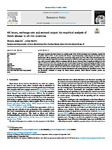Oil boom, exchange rate and sectoral output: An empirical analysis of Dutch disease in oil-rich countries
| dc.contributor.author | Alssadek, M | |
| dc.contributor.author | Benhin, James | |
| dc.date.accessioned | 2021-11-23T11:42:24Z | |
| dc.date.available | 2021-11-23T11:42:24Z | |
| dc.date.issued | 2021-12 | |
| dc.identifier.issn | 0301-4207 | |
| dc.identifier.issn | 1873-7641 | |
| dc.identifier.other | 102362 | |
| dc.identifier.uri | http://hdl.handle.net/10026.1/18404 | |
| dc.description.abstract |
This paper examines the Dutch disease in a global sample of 36 oil-rich developed and developing countries for the period 1970 to 2016. It also examines the theory comprehensively by considering the two Dutch disease intermediate effects: spending and resource movement. Using panel data fixed effect with Driscoll-Kraay standard errors estimation approach, our results show that an oil boom causes appreciation in the real exchange rate and a fall in sectoral output, which is consistent with the theory. However, there is significant difference in the effects of oil boom on the real exchange rate and sectoral output among sub-regional groupings, possibly because of differences in the extent of institutional quality and economic policy. The implications of these results are that policy makers of countries affected by Dutch disease should improve institutional quality, minimise real exchange rate appreciation and promote domestic investment in the manufacturing and agriculture sectors. These are necessarily conditions to escape the Dutch disease problem, which hinders economic growth and development. | |
| dc.format.extent | 102362-102362 | |
| dc.language | en | |
| dc.language.iso | en | |
| dc.publisher | Elsevier | |
| dc.subject | Dutch disease | |
| dc.subject | Oil boom | |
| dc.subject | Cross-sectional dependence | |
| dc.subject | Fixed effect with driscoll and kraay standard errors | |
| dc.title | Oil boom, exchange rate and sectoral output: An empirical analysis of Dutch disease in oil-rich countries | |
| dc.type | journal-article | |
| dc.type | Journal Article | |
| plymouth.author-url | https://www.webofscience.com/api/gateway?GWVersion=2&SrcApp=PARTNER_APP&SrcAuth=LinksAMR&KeyUT=WOS:000700368100108&DestLinkType=FullRecord&DestApp=ALL_WOS&UsrCustomerID=11bb513d99f797142bcfeffcc58ea008 | |
| plymouth.volume | 74 | |
| plymouth.publication-status | Published | |
| plymouth.journal | Resources Policy | |
| dc.identifier.doi | 10.1016/j.resourpol.2021.102362 | |
| plymouth.organisational-group | /Plymouth | |
| plymouth.organisational-group | /Plymouth/PRIMaRE Publications | |
| plymouth.organisational-group | /Plymouth/REF 2021 Researchers by UoA | |
| plymouth.organisational-group | /Plymouth/REF 2021 Researchers by UoA/UoA17 Business and Management Studies | |
| plymouth.organisational-group | /Plymouth/Research Groups | |
| plymouth.organisational-group | /Plymouth/Research Groups/Marine Institute | |
| plymouth.organisational-group | /Plymouth/Users by role | |
| plymouth.organisational-group | /Plymouth/Users by role/Academics | |
| dcterms.dateAccepted | 2021-09-13 | |
| dc.rights.embargodate | 2021-11-24 | |
| dc.identifier.eissn | 1873-7641 | |
| dc.rights.embargoperiod | Not known | |
| rioxxterms.versionofrecord | 10.1016/j.resourpol.2021.102362 | |
| rioxxterms.licenseref.uri | http://www.rioxx.net/licenses/all-rights-reserved | |
| rioxxterms.licenseref.startdate | 2021-12 | |
| rioxxterms.type | Journal Article/Review |


